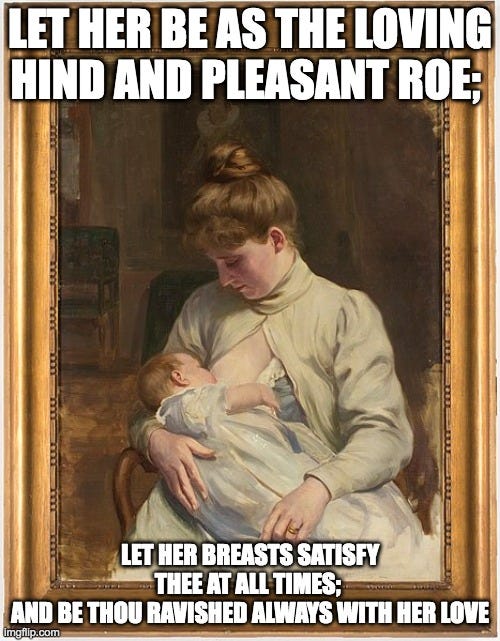On the first Feminian Sandstones we were promised the Fuller Life (Which started by loving our neighbour and ended by loving his wife) Till our women had no more children and the men lost reason and faith, And the Gods of the Copybook Headings said: "The Wages of Sin is Death.”
Rudyard Kipling, the God’s of the Copybook Headings
Jesus said for us to love our enemies. He stated that loving God and loving our neighbour were the most important commandments. The Scriptures say that God is love. So love would seem to be a rather important issue in life. Who we love, how we love. Indeed, what is love?
Introduction
This post is one of several in reaction to the comments and posts of Addam. In particular this post is a reaction to his statement:
I'm interested in whether you believe I am an evil person, despite my better qualities, simply because I love people who your god has said (without providing good reason) that I'm not supposed to love.
Addam
Our modern world would instantly bow down in the face of this statement. Of course we should not judge anyone based on who they love!
But is that true? Indeed, is it accurate? Don’t we have to do a little bit of work to unpack what is meant by ‘love’ here?
Love and Sex are not the same thing
There are all sorts of people in our lives that we love, but don’t have sex with. We should love our mother… but we should not have sex with her. We should love our children… but we should not have sex with them. Our neighbour, our boss, our students, our gerbil…
There are lots of people (and animals, and food) that we love, that we appropriately love, but that we don’t, and, indeed, shouldn’t, have sex with. So when someone says, “Why do you care who I love?” The answer, quite rightfully, is, “I don’t. I care you have sex with.”
Love and Lust are not the same thing
Indeed there are lots of people we would like to have sex with, whom we don’t love. Our televisions (assuming you are foolish enough to have such things) fill themselves up daily, indeed hourly, with all sorts of people whose dress and mode of acting are designed to get us to lust after them… but whom we don’t know from Adam (pun intended) and don’t love.
Different Kinds of Love
The Christian, or Christian adjacent, probably saw this section coming from the beginning. Of course, as a theologian, I am now going to point to the different kinds of ‘love’ spoken of in the New Testament!
Storge: Natural Affection
Storge love is only mentioned in the negative in the New Testament. It is translated ‘natural affection’; and is the natural love that a mother has for her offspring.
However male on male sexuality is listed as an unnatural affection (altho not using that word).1 While it may be natural for a mother or father to love their children, the kind of love that Addam is talking about here is not storge.
Phileo: Brotherly Love/Friendship
The Scripture’s widest type of love is ‘phileo’. The word gets used in a dozen different ways: husband/love, children/love, etc etc. But while phileo includes the love a wife is supposed to have for her husband, it is not the desire toward sex. A wife may have sex with her husband because she loves him; but the phileo love that is behind that is not a drive to sex, but a drive to please, to promote, to fulfil.
Thus the kind of love that Addam is talking about is not Phileo.
Agape: Godly Love, unconditional love
Still less is the pinnacle of Scriptural loves sexual. True, a husband is supposed to have agape love toward his wife, and as part of that he will have sex with her; but the love is toward her good, not toward his lust.
Thus the kind of love that Addam is talking about is not Agape.
Eros: Sexual Love/Lust (not actually mentioned in the NT)
There is absolutely nothing wrong with the feelings of physical attraction that a married man is supposed to have toward his wife; or that she is supposed to have back. Indeed the Scriptures promote that expression in several places.
But erotic love is not a goal in and of itself. It is something that is designed to promote and protect the marriage between a man and a woman, and the production of children. It is not some random free for all.
When Addam is talking about love, the closest of the Greek words he could be thinking of is Eros.
Love is not a feeling
But one of the most important aspects of all true love is that it is not a feeling. Feelings may very well accompany love, as they do anything else. But true love is what happens despite feelings, not what happens because of them.
And love is not unique in this. One of the most important things that we teach little children is called ‘emotional regulation’. Basically, ‘Yes, you may feel mad at your sister. But you may not hit her over the head with your truck.”
Maturity in life is a constant process of disconnecting feelings with actions. You feel like sleeping in… you nevertheless get up and go to work. You think that bride looks ugly in that dress… you nevertheless use all of your photography skills to get the best picture of her in that (ugly) dress.
Love, we are reliably informed, is patient. Patience, is, by its very definition, against feeling. You don’t have to ‘patiently’ eat ice cream, or listen to a beautiful piano piece. You have to ‘patiently’ listen to your eight year olds piano recital with the two hundred and twenty seven so far (you’ve been counting) mistakes or restarts.
So when Addam asks, “Why do you care who I love?” The answer, quite rightfully is, “I don’t. But I do care what you mean by ‘love’.”
Conclusion: Lust is not a god
So the conclusion to the matter is this: Lust is not a god. It may well be a demon, but it is no god. We may lust after all sorts of things, but our virtue is literally measured in how successfully we resist inordinate lusts. A little ice cream… no problem. A freezer continually restocked and emptied… the sin of gluttony.
So the question is not who you can love, but how you should love. You may want something, but you know you should not get it. Or not now. Or not in this way.
Male on male sexual activity is always wrong. (It is not alone in this.) Thus when we act on our desire for it we are not acting in ‘love’, but in hate. A hate for ourselves and for the other.
So when Addam asks, “Why do you care who I love?” I hope I have made my answer clear. There are different types of love, and different people. And some forms of love are appropriate for some kinds of people, and others are wildly inappropriate. And some meanings of ‘love’ are simply false, but are, instead, a form of hatred.
So that is why I ‘care who you love’.
Thank you for reading Von’s Substack. I would love it if you commented! I love hearing from readers, especially critical comments. I would love to start more letter exchanges, so if there’s a subject you’re interested in, get writing and tag me!
Being ‘restacked’ and mentioned in ‘notes’ is very important for lesser-known stacks so… feel free! I’m semi-retired and write as a ministry (and for fun) so you don’t need to feel guilty you aren’t paying for anything, but if you enjoy my writing (even if you dramatically disagree with it), then restack, please! Or mention me in one of your own posts.
If I don’t write you back it is almost certain that I didn’t see it, so please feel free to comment and link to your post. Or if you just think I would be interested in your post!
If you get lost, check out my ‘Table of Contents’ which I try to keep up to date.
Thanks again, God Bless, Soli Deo gloria,
Von
Several words are used in Romans 1 to describe the evil of this kind of sexuality, including ‘uncleaness’; ἀκαθαρσία; akatharsia;’ ak-ath-ar-see'-ah; From G169; impurity (the quality), physically or morally: - uncleanness.
‘vile’ ἀτιμία;atimia; at-ee-mee'-ah; From G820; infamy, that is, (subjectively) comparative indignity, (objectively) disgrace: - dishonour, reproach, shame, vile.
Against or leaving ‘natural’ φυσικός;phusikos;foo-see-kos'; From G5449; “physical”, that is, (by implication) instinctive: - natural. Compare G5591.
Against ‘nature’ φύσις; phusis; foo'-sis; From G5453; growth (by germination or expansion), that is, (by implication) natural production (lineal descent); by extension a genus or sort; figuratively native disposition, constitution or usage: - ([man-]) kind, nature ([-al]).
’Unseemly’; ἀσχημοσύνη; aschēmosunē; as-kay-mos-oo'-nay; From G809; an indecency; by implication the pudenda: - shame, that which is unseemly.
‘Error’ πλάνη ;planē; plan'-ay; Feminine of G4108 (as abstraction); objectively fraudulence; subjectively a straying from orthodoxy or piety: - deceit, to deceive, delusion, error.








